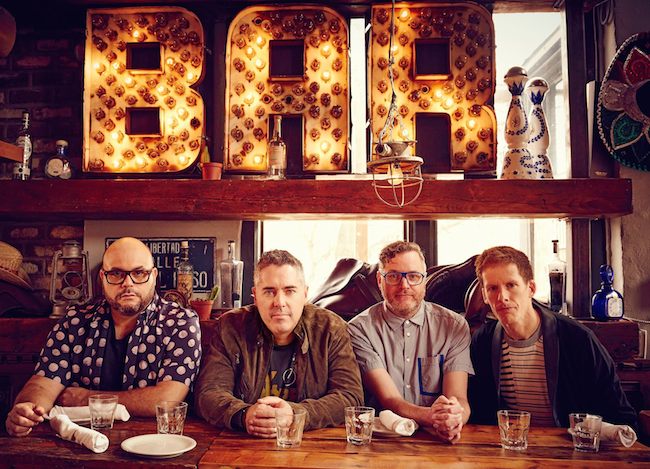
Barenaked Ladies: four musicians walk into a bar…
With their new live album in stores now, we catch up with Ed Robertson of Canadian college rock veterans Barenaked Ladies
Formed in 1988, Barenaked Ladies made their recorded debut with a self-titled cassette in 1990. Since then, they’ve gone to release 11 studio albums plus four live albums, a ‘holiday’ album, the soundtrack to a Shakespeare production and an album of songs for children. In their native Canada, they’re big, big stars. In the US and (particularly) the UK, commercial success has been harder to come by, bar a purple patch in the late 90s when the album Stunt went Top 20 both sides of the Atlantic, but they remain a cult favourite, a status that was enhanced in 2007 when they were chosen to provide the theme song for hit comedy The Big Band Theory.
Another important factor in that cult appeal is their live shows, which feature a great deal of improvisation and comedic banter between the band members. So key to Barenaked Ladies’ appeal are those live gigs, in fact, that since 2004 nearly all of them have been made available to fans as MP3 downloads, or on CD-R. That’s in addition to the four live albums, the latest of which, BNL Rocks Red Rocks, has just been released.
With a UK tour coming up in September to promote the new album, we got frontman Ed Robertson on the phone to find out more about the Barenaked Ladies’ approach to live performance…
Read how Barenaked Ladies’ hit One Week was written
Live albums are quite an important thing for you, aren’t they?
“Yeah. I think the career of this band was built on the live show, there’s a lot of spontaneity and improv that I think sets us apart from a lot of other bands playing live. The live aspect has always been a real calling card, and fans of the band, that’s how they convince people, that’s how they show people what they love about this band – they bring them to a show. It’s a whole different dimension to the band, so it’s always been important to us and it’s a great way to let people know about that other dimension.”
What’s the difference, as you see it, between the official live albums and the unofficial ones?
“Well… every night is different with us, we make up songs every single night. Sometimes they’re garbage, and I actually enjoy it quite a bit when they fall flat on their face. I love when things fall apart in a glorious way. We have fun with it. But some nights, most nights even, songs come out that you would swear were rehearsed: they have choruses, they have harmonies, they make sense lyrically, they’re funny, they’re topical… sometimes we walk offstage going “Oh my God, that song!” And sometimes people will come to us and request some improvised song that we’ve forgotten ever existed. But they’ve got a live recording and they’ve listened to that song hundreds of times, and they’re like, ‘Are you going to do the pipe guy song tonight?’ and I have to tell them there is no pipe guy song – that was total improv.
“I think a lot of bands try really hard to replicate what’s on their records, live. Nothing could be further from my interest. The record’s there, so if you want to listen to the record, listen to the record! The live show is a totally different experience. I’m not trying to replicate the record, I’m trying to entertain the audience, and that’s a whole different process to having someone put on headphones and dig a studio recording. I love that, too, but it’s a whole different aspect of what we do.”
It’s hard to talk about such an approach and not mention the Grateful Dead and other jam bands of their ilk. Have they been an influence?
“No, for some reason that thing has never appealed to me. We’re not of that jam band stream at all… that’s a bit more about sprawling solos and musical exploration. I’d say Phish were a bit closer to us than Grateful Dead or Widespread Panic, but we’re not a jam band by any stretch of the imagination. We play a super-tight, incredibly rehearsed 20-song set, and then there’s five or six things that happen over the course of the evening that are spontaneous and improvised and silly and fun. But I think what makes those moments so special is that the rest of the show is very rehearsed and very tight.”
“When we’re together, there’s a lot of silly behaviour”
BNL Rocks Red Rocks made me laugh out loud several times. Can you honestly say none of the patter between songs is ever recycled?
“It honestly isn’t. I never repeat things. We did several UK tours with a comedian called Boothby Graffoe, and he’d come backstage every night and say, ‘That bit you did about the rides at Bristol pier… I’ve been working stand-up for 30 years and I know successful comedians who would never believe that was improvised.’ But it always was: we just don’t repeat stuff, that’s part of the ethos of the band, it’s about that evening, that audience and that show. Sometimes it’s great, but I’m sort of duty-bound to not reuse it.”
And is that something that only happens onstage, or are you just like that as a band? Is the tour bus a constant deluge of wisecracking, or do you all sit with your noses buried in your iPads and then come alive on stage?
“It’s kind of a combination of the two. When we’re together, there’s a lot of silly behaviour, it’s a very fun place to be. If you need a break, then sometimes I’ll go in my bunk to read a book or I’ll go in the back lounge to watch a movie, but the atmosphere around the band is pretty full-on at all times. It’s a group of very talkative, gregarious guys who love to have fun and play pranks on each othter. It’s not like we’re this bunch of dour, introspective guys who get on stage and turn it on… it’s a pretty fun place to be 24/7.”
Is that key to your longevity?
“It is. I think being able to laugh at ourselves and laugh at each other has been a huge key to the longevity of this band, and to not take ourselves very seriously. We take the shows seriously, we take the music seriously, but we recognise that we’re incredibly fortunate to be able to have a career as rock musicians and we’re careful not to take ourselves too seriously.”
So it’s like the polar opposite of, say, The Ramones, where Joey and Johnny didn’t speak for 20 years…
“Yeah, I can’t imagine that. I’ve heard about the Everly Brothers, too: they had separate dressing rooms and at venues, there’d be pathways taped out on the floor so that they wouldn’t have to see each other before they walked onstage. I just can’t imagine that… this is a joyful thing we do and if you hate it, you should really stop doing it. We love it, though: we all still ride on the same bus, we share a dressing room, we share everything. We’re a group of people that know how to enjoy each other, know how to support each other and know how to take space when we need it.”
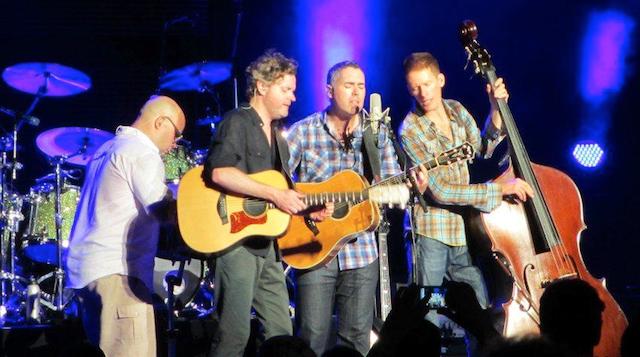
Playing live in 2008. Pic: Reverend Mick man34/Wiki Commons
Talking of the live shows… you’re playing some pretty big UK venues for a band that haven’t troubled the charts for a while!
“Yes, we have an amazing fanbase in the UK which is why we keep going back. We’ve had virtually no action on any kind of chart or critical lists, none of that, but we have an amazing fanbase over there and we love doing shows there. It’s a break-even prospect at best, we spend two or three weeks staying in tiny little hotels, but the shows are worth every bit of it. It’s been every couple of years for the past decade or so, but the reaction last time (last year) was just so great we said to our agent, get us back there as soon as possible!”
You’re touring under the ‘Last Summer On Earth’ banner again. Last time you had Colin Hay and Violent Femmes with you, this time you’ve got OMD and Howard Jones. How do you go about choosing the bands for those tours?
“It seems like now, we’re basically going through every band whose songs I played in my high school covers band! These past couple of years have been like dream tours for me, we’re going back and forth with Howard Jones right now because we’d like him to come up during our set and do a song with us, and I’m so excited about that. I’m emailing the keyboard player from my high school band going, ‘Dude, I’m going to be performing with Howard Jones this summer!’.
“The whole idea of the Last Summer On Earth tour is that it’s an entertaining evening, so we want bands with a bunch of hits where people come out and they’re really, really entertained.”
So is that a dream come true for you – putting on these bands that you used to look up to yourself?
“Absolutely. And for me, I want the strongest acts possible before we hit the stage. I think some headliners, they think ‘Shit, I don’t want to put someone who’s too good on before us,’ but for us, the better an act is before us, the higher it sets the energy bar for us and then we go out and really have a blast with it. I’m really looking forward to touring with Howard and OMD because I was such a fan of their music. It’s going to be a really fun summer for me.”
Talking quickly about your songwriting… traditionally it was mostly you and Steven [former singer-guitarist and co-founder Steven Page] that did the songwriting, but then the others chip in songs as well, is that right?
“Well certainly that was the way it was up until [2010 album] All In Good Time, when I became the principal writer, although Jim and Kev have contributed a song or two to each record.”
“I grew up with country music: simple stories, simple melodies”
So how does that work? Does whoever’s written a song tend to bring it to the studio more or less complete, or is there a jamming in the studio element?
“There’s definitely a jamming in the studio element. I write what are very skeletal songs, like I’ll have the melody, the harmonic structure and the chords in my head, but I really look forward to what Jim and Kev are going to add in terms of melodic ideas, the arrangement, and what Ty brings rhythmically to it… I count on those guys to make my simple songs more interesting, and I look forward to that part of the process.
“I kind of grew up with country music, simple stories, simple melodies and quite straight-ahead songs. So when I bring a song to the guys and it takes on this whole new life, with Kevin’s piano part or guitar part, and Jim totally reharmonises the bass structure of the melody, that’s so exciting to me. That’s what’s great about having a great band: your songs become so much more than they would if you just did it on your own.”
A lot of bands that write like that tend to share the songwriting credits, but you don’t…
“Yeah. Typically music and lyrics are what constitutes a songwriting credit, but what we do is we share all the royalty streams from the publishing. So the credit is a nod to who wrote the song, but we recognise that the whole band contributes to the process of writing and recording and performing that song, so we share all the back-end royalties.”
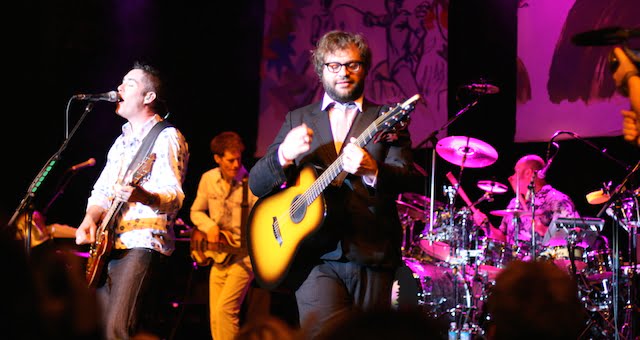
Live on the Ships & Dip cruise, 2008. Pic: PeterJ1977/Creative Commons
Just quickly before you go, we’ve got to ask you about the Big Bang Theory theme…
“I wrote it and recorded it in the place I’m sitting right now – I’m up at my cottage north of Toronto. I had read a book called Big Bang, by a British science writer called Simon Singh. I love his books, he’s awesome. And so I read his book Big Bang and I loved it, I was totally blown away. It sort of serves as a step-by-step of every mathematical and scientific discovery and breakthrough that was required to get from zero to understanding cosmological theory. It’s really an amazing read and it’s a fun read, too.
“And then I was doing a show in LA just after having read the book, and I made up a silly song in one of our improvs one night, about red-shifting galaxies and dark matter and all this cosmological stuff I’d just been reading about. And Bill Prady and Chuck Lorre happened to be in the audience that night, and they were developing their show The Big Bang Theory, so they contacted me after the gig and said, ‘You have to write the theme song for our show.’ It was quite a serendipitous thing!
“I wrote the 30-second song in the shower at my cottage, I recorded it in my bathing suit on my laptop on the bed that I’m currently sitting on, emailed it to LA and they loved it. They actually wanted to use the version I recorded in GarageBand on my laptop at first – they didn’t want a full-band version, they wanted the version that was just me singing into my laptop with an acoustic guitar! But I convinced them to let us do a full-band recording and then, well, there you go.”
Has it been a shot in the arm for the band, having that exposure?
“It’s been incredible. Not just the exposure on the show, but the familiarity of the song. It’s our biggest hit by far: it’s bigger than a No 1 hit on the Billboard chart, because it plays to millions of people all over the world, every single day. So it’s one of the biggest moments in our live show now too.”

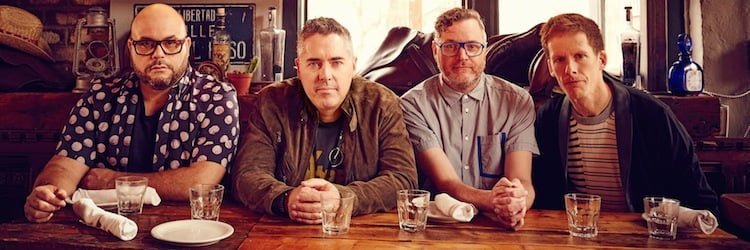

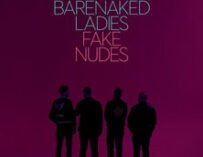
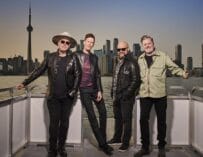
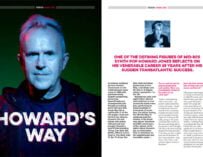
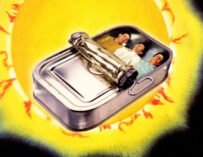
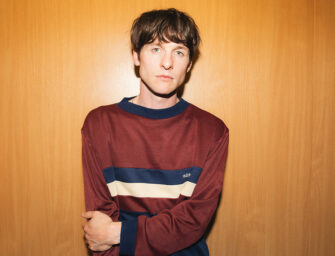
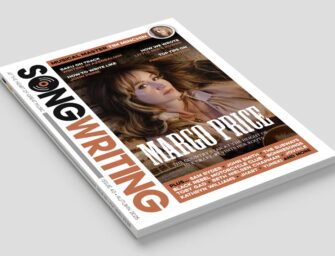
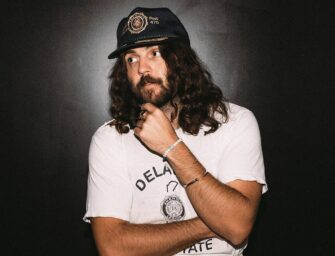
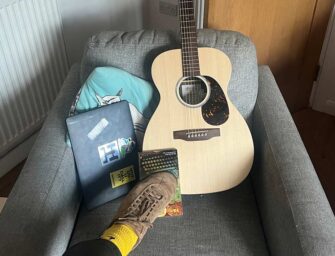
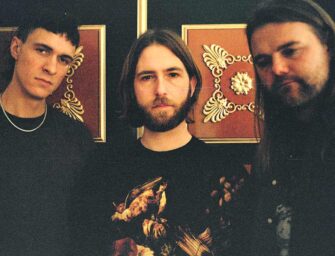





















It’s Ed Robertson, not Rogerson.